Key takeaways
- Louisiana’s tax system relies heavily on sales taxes, disproportionately affecting lower-income families and raising questions about fairness and equity.
- Recent reforms aim to simplify the tax code, adjust tax brackets, and increase exemptions for property tax, focusing on providing relief to struggling households.
- Community discussions emphasize the potential of tax reforms to stimulate local economic growth and ensure that small businesses are supported alongside larger corporations.
- Residents express hope for a more equitable tax system that reflects shared values and fosters collaboration within communities.
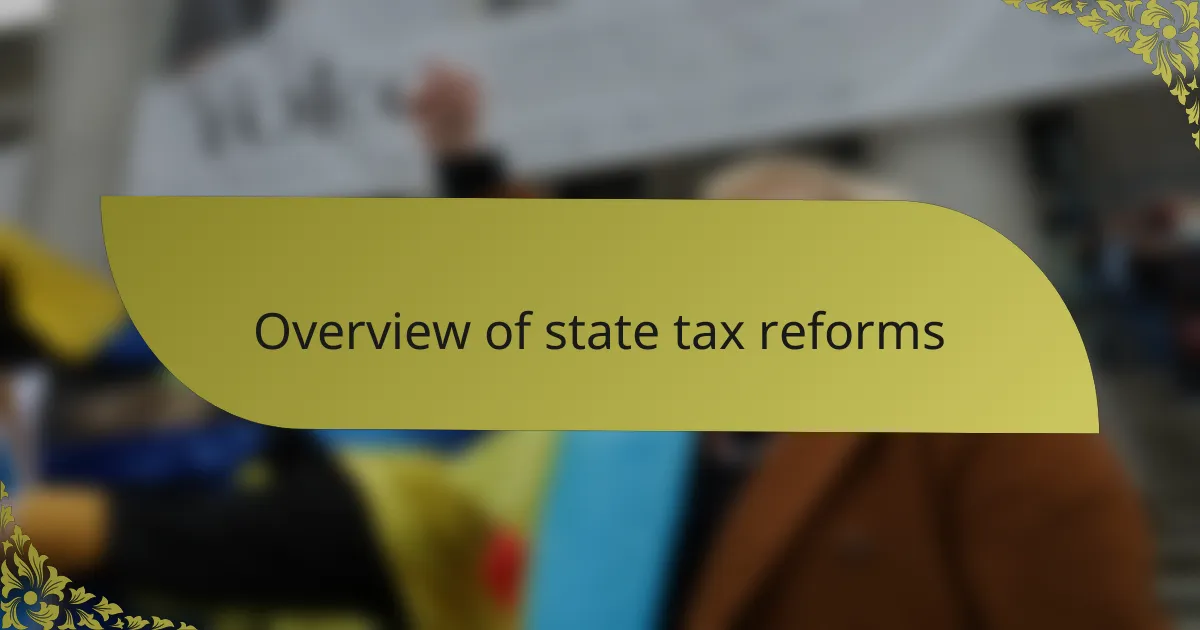
Overview of state tax reforms
State tax reforms often stir a range of emotions and opinions among residents, especially in Louisiana, where the tax system can feel complicated. It’s intriguing to witness how these reforms aim to boost the economy while addressing fiscal challenges. Reform discussions often raise questions, like: How will changes affect my own tax burden? I remember when local tax debates saw heated town hall meetings; it felt clear that everyone had a stake in the conversation.
Historically, Louisiana has faced unique challenges due to its reliance on sales taxes, which often disproportionally affects lower-income families. The push for reforms sparked passionate discussions within my community about equity and fairness in our tax system. It’s these personal stakes that make tax reform not just a policy issue but a deeply personal one, touching on how our lives are directly impacted by fiscal policy.
Recently, initiatives have emerged to simplify the tax code and reduce the overall tax burden on residents. I found it fascinating to see various proposals aiming to eliminate certain tax loopholes while also seeking to enhance funding for critical services, like education and healthcare. It raises a compelling thought: how will these changes shape our community’s future? As we navigate these reforms, I often reflect on their potential long-term effects on the state’s economy and our everyday lives.
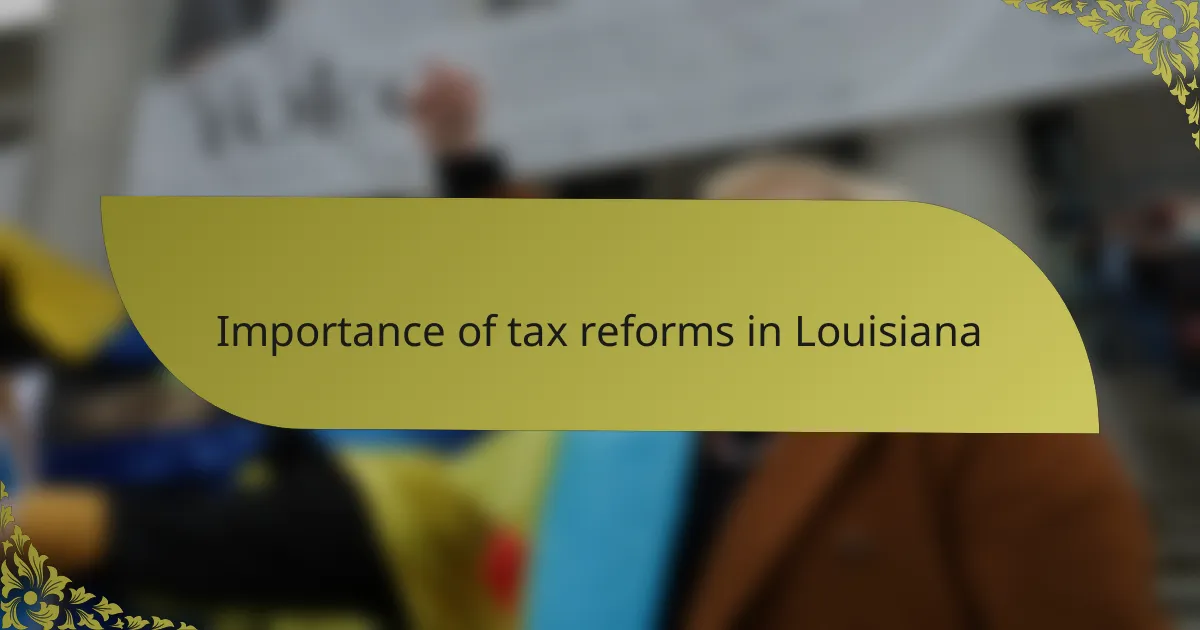
Importance of tax reforms in Louisiana
Tax reforms in Louisiana hold significant importance as they can lead to a more equitable distribution of the tax burden. I recall moments in community meetings where fellow residents expressed frustration over the weight of sales taxes. It’s a stark reality when the very system meant to fund essential services falls disproportionately on those who can least afford it. How can we build a fairer society without acknowledging these disparities?
Moreover, reforming the tax code can stimulate economic growth, which is crucial for Louisiana’s future. I often think about the potential for new businesses to flourish if the tax environment becomes more conducive to entrepreneurship. For instance, imagine a startup thriving in a community that feels supported by its tax policies—couldn’t that invigorate local job markets and opportunities?
Finally, tax reforms are essential for investing in our public services, like education and infrastructure, which are foundational to societal well-being. I remember my own educational journey and how crucial funding was to shaping my future. If we don’t prioritize these reforms, how can we expect to provide a quality education and maintain safe streets for the next generation? The connection between taxes and quality of life is undeniable, and it’s essential we address this.
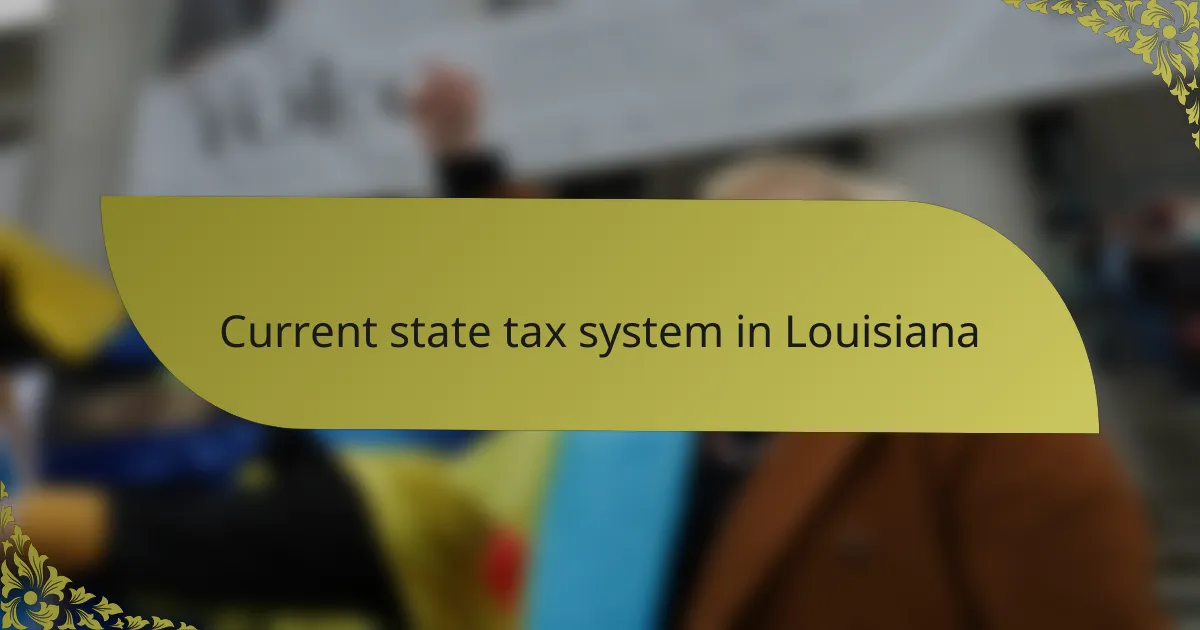
Current state tax system in Louisiana
Louisiana’s current tax system is notably characterized by a heavy reliance on sales taxes, which can sometimes feel burdensome. I’ve often heard people in my community express their frustration—how can a system that’s supposed to support us end up weighing so heavily on those who can least afford it? This reliance creates a vulnerability, especially for low-income families who find themselves disproportionately affected by rising costs.
When I dive deeper into Louisiana’s tax structure, it’s clear that the lack of a state income tax, while appealing to some, raises questions about fairness. I recall a town hall where a single mother spoke about her struggles to make ends meet. How do we balance attracting new businesses with ensuring we don’t leave our residents behind? It’s an ongoing conversation that resonates with many of us, where the challenges we face personally reflect broader systemic issues.
Compounding these complexities, our tax system is riddled with exemptions and loopholes that often favor larger corporations over everyday citizens. Just recently, I attended a local discussion where someone pointed out that while we want to encourage business investment, we must also ensure that the tax structure doesn’t create a playing field that leaves small businesses struggling. Isn’t it crucial that we strive for a system that supports everyone, not just a select few? This is the evolving narrative of Louisiana’s tax system, as we look towards future reforms that hopefully pave the way for greater equity.
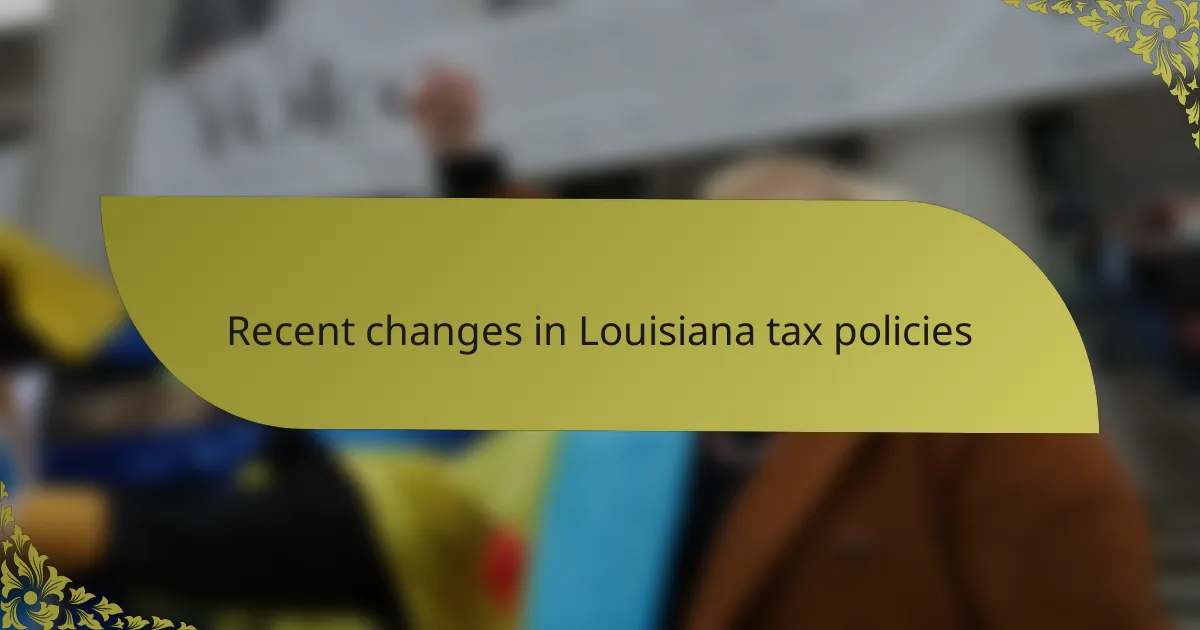
Recent changes in Louisiana tax policies
Recent changes in Louisiana tax policies have sparked quite the discussion among residents and taxpayers. For instance, the recent efforts to simplify the income tax structure aim to alleviate some of the burdens many families face. Personally, I’ve felt the weight of complex tax regulations during tax season, so any move towards clarity is something I can appreciate.
One notable change is the adjustment of tax brackets to a more equitable system, aimed at reducing the tax burden on lower-income residents. This reform is crucial as many families in Louisiana struggle to make ends meet. Additionally, the state has been exploring increased exemptions for property tax, which resonates with homeowners like me who often feel overwhelmed by rising property values.
- Streamlined income tax brackets to ease filing for residents.
- Increased property tax exemptions to benefit homeowners.
- A focus on equitable taxation to support lower-income families.
- Attempts to eliminate the sales tax on essential goods.
- Introduction of tax incentives for small businesses to foster economic growth.
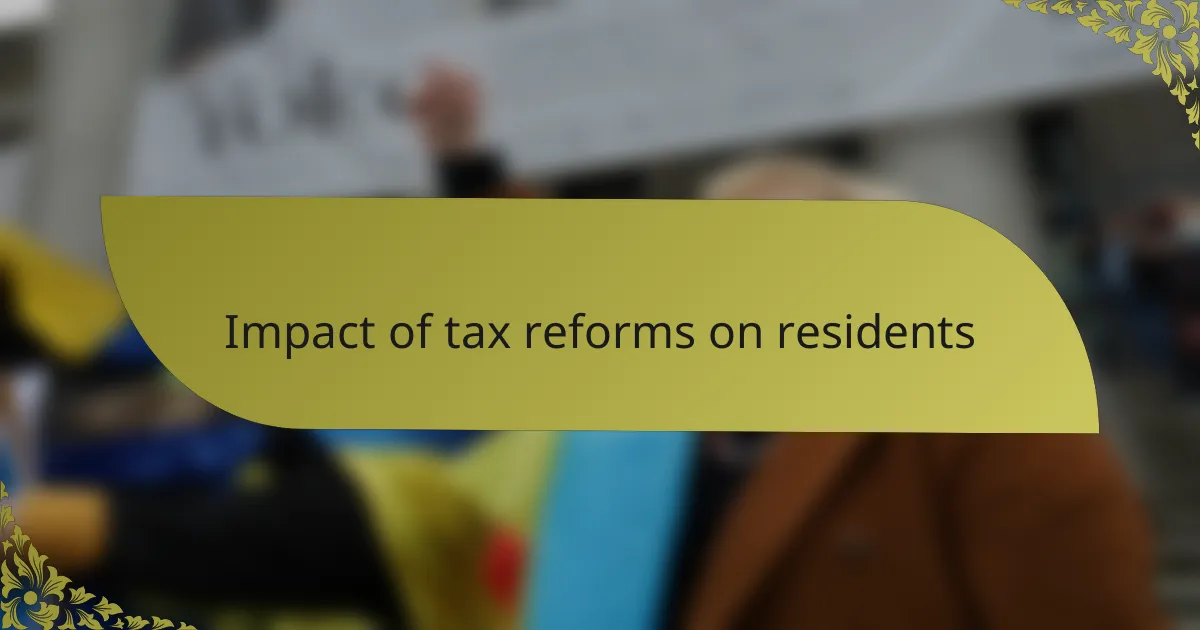
Impact of tax reforms on residents
The impact of tax reforms on residents in Louisiana is a complex reality that often unfolds at the kitchen table. I remember discussing the potential changes with my neighbors and feeling an underlying sense of hope mixed with skepticism. How will these reforms actually make life better for families like ours? The promise of lower taxes can feel invigorating, but it’s essential to ask how that translates into everyday experiences.
For many Louisianans, the recent shifts aim to provide much-needed relief, especially for lower-income households. I recall a conversation with a single-parent friend who struggles to make ends meet. The thought of reduced sales tax on essentials brought a glimmer of hope. But will these adjustments provide enough support to truly ease the financial strain? It’s a lingering question I find myself pondering, especially as I witness the day-to-day struggles many face.
As we see these changes take root, there’s a palpable mix of anticipation and wariness in the air. I often think about how tax reform might strengthen local communities. Will we see more businesses flourishing because of incentives? As a resident, I can’t help but wonder if a more equitable tax system will foster a sense of unity and collaboration among us. In the end, it feels like we are all on this journey together, striving for a tax system that reflects our shared values and goals.

My perspective on Louisiana tax reforms
The tax reforms proposed for Louisiana evoke a spectrum of emotions for me, largely because I see the potential impact on my community’s daily lives. I think about my own family dinners where we sometimes discuss how we manage our limited resources. Will these changes truly make a difference? I hope they will, but only time will tell if they provide the relief many of us need.
Reflecting on the recent attempts at reform, I can’t help but feel encouraged by the conversation around simplifying the tax code. I remember navigating that labyrinthine process myself—a task that often seemed more complex than it needed to be. When I hear about plans to streamline tax brackets, I wonder how this could ease the mental burden for so many families still trying to make sense of it all.
However, the real crux of my perspective revolves around the notion of fairness. As we discuss tax incentives for small businesses, I often think about my neighbor who runs a local shop. How can we ensure these reforms don’t benefit just a select few while leaving others to struggle? In our pursuit of an equitable tax system, I believe it’s vital that we keep these conversations going—everyone’s voice matters in shaping a fairer future for Louisiana.